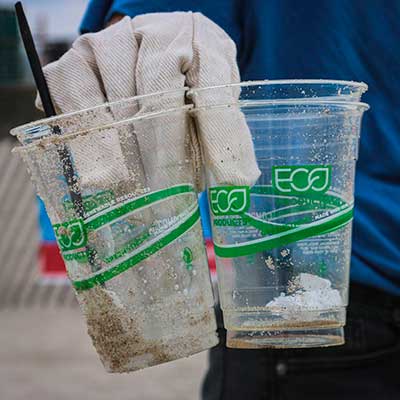What is greenwashing and how to avoid it
Entramos en detalle![]()
What is Greenwashing
In this post we deal with Greenwashing, one of the techniques increasingly used by companies in full transition towards a more sustainable consumption and less honest with the customer in order to get more sales of their product.
Greenwashing, is a term in English that comes from the words «Green» means «green» + «washing» means «washing» used to describe the misleading practices that some companies carry out when they present a product or any proposal as respectful for the environment when it is not. The term Greenwashing as such is quite new, it began to be used in the early 1990s after the Earth Summit in Rio de Janeiro in 1992. Today it is a term extended worldwide to define the greenwashing techniques carried out by companies.
Companies whose principles are based on fast, large-scale and artificial sales try to continue to have a reputation in the face of a changing consumption model, where the consumer is informed and their values are increasingly aligned with sustainability. Before this situation, many companies play dirty and Greenwashing comes into play.
These companies lack environmental values and that is why they resort to green marketing techniques where they sell us an idea when in reality the product does not correspond to what they indicate. It is washing the image of the product with sustainable claims, texts or images to sell more!

How does Greenwashing work?
With increasing pressure from socially conscious consumers, companies are striving to reduce their environmental impact. The concept of Greenwash is understood as "the induction of the public towards error or different perception, emphasizing the environmental credentials of a company, person or product when these are irrelevant or unfounded" Due to the lack of regulations, companies can easily intentionally manipulate consumer perception. When companies brand themselves "green", they enhance their brand image and consumers are misled into supporting unethical environmental crimes.
Two of the notorious examples of greenwashing have been the case of Volkswagen< /a> or that of the cosmetic brand Innisfree (a PP plastic bottle wrapped in cardboard and sold as "Hello, I'm a cardboard bottle" the deception was uncovered by a user in Korea).

Right now the most obvious greenwashing is that of plastic packaging, and that we will have to wait until action is taken against this form of greenwashing.
Greenwashing in Cosmetics
Did you know that the cosmetic industry is one of the most polluting industries? Unfortunately this is the case, the abuse of plastic containers generates more than 12 billion a year.
Given the growing interest in natural cosmetics, consumers are increasingly demanding more sustainable packaging aligned with skin-friendly products. Faced with this growing demand and the need not to lose sales, brands packaged in plastic resort to greenwashing.
And why don't they use sustainable packaging? Mainly due to costs, alternatives to plastic containers such as aluminium, glass or cardboard entail a higher cost, hence the use of greenwashing and the attempt to make plastic green (here it enters "bio" plastic)
Why is Greenwashing harmful?
Apart from the obvious, greenwashing misleads you and misleads you as a consumer. It can lead you to think that you are supporting products and brands that align with your own green values, when in fact you are not.
4 easy tips to detect the greenwash of a product or brand. It's not always easy, but I'm sure these tips will help you.
- Don't be left with words, find out. who is behind the product, and above all its values.
- Obvious. A plastic container cannot be sustainable, that is the problem. Fashion in Asia cannot be ethical. These are obvious things, but they are increasingly being sold to us by companies that use greenwashing.
- Use common sense. Do you really think that macro brands with low costs can be sustainable?
- See resources. There is more and more information, books, blogs and organizations that provide information to help you in your sustainable transition.
- In the case of cosmetics, if the company or website does not show you the ingredients, mandatory INCI list, it is with total security because the product is neither natural nor sustainable. Demand transparency, it is your right to know what you put on your skin.
